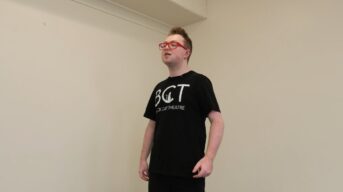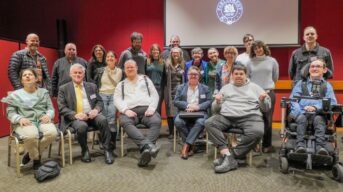Big win for our Hard to swallow campaign
We have great news. NSW Disability Minister, Gareth Ward has just announced a new agreement between the NDIA and the states. They have reconsidered their position on funding health-related supports and therapies like swallowing therapies and decided that the NDIA will now fund them.
This is great news not just for Tanisha and Ellen, who feature in our Hard to swallow campaign, but also for the many people with disability on NDIS plans who need health-related supports and therapies, including people needing insulin injections and those with respiratory issues needing oxygen tanks.
Minister Ward has confirmed that “Under the agreements made today, the NDIS will also fund support for disability-related health needs including swallowing, respiratory issues, and continence aids.” He says that “The Council also agreed to fund arrangements for disability-related supports and daily living expenses for children with disability living outside the family home.”
This announcement comes after a recent win in the administration tribunal for people with swallowing problems reported in The Guardian. The article describes the win as a ‘watershed’, arguing the NDIA would now be forced to fund swallowing supports and would eventually mean an end to the long-running battle between the NDIA and state health.
This has now occurred and the decision of the Council of Australian Governments (COAG) and the Disability Reform Council makes swallowing funding permanent.
Our CEO Justine O’Neill has welcomed the news, saying “The NDIA has, until now, been taking a too narrow a view of its responsibilities with regards to health related therapies for people with disability. Simply put these health-related therapies and supports are critical and leaving people with disability without them puts lives at risk. This announcement is a positive development for the many NDIS participants who need ongoing health related therapies to maintain social interaction, quality of life and independence.”
CID will be watching closely to see how this is delivered by the NDIS to ensure that people with disability are now able to access these health-related supports and therapies as part of their NDIS plans.
Find out more
- NSW Minister Gareth Ward’s Media Release: Delivering outcomes for people with disability.
- COAG and Disability Reform Council Communiqué and factsheet, 28 June 2019.
- Australians with life threatening swallowing condition win NDIS battle, The Guardian Australia.
- Minister Paul Fletcher’s Media Release: NDIS supports participants with dysphagia.
- Backdown over axing of NDIS funding to life-threatening condition, The Guardian Australia.
- Our Hard to Swallow campaign.
Transcript
Bronwyn Flemming:
Tanisha’s got a rare genetic disorder. And as far as we know she’s one of very few, if not the only one like it in the world. She’s got a duplication of chromosome 5q and a deletion of 18p.
She has problems with her swallowing and she chokes most nights.
Mainly of a night when she’s tired, but she can choke even at breakfast time or lunch, it doesn’t matter.
It’s a thing called Oral Motor Dysphagia, which is on top of her disorder.
She’s a SWAN. So she’s like a Syndrome Without A Name.
Tanisha loves Harley to death. He just makes her laugh, he makes her smile.
He is a very huge part of her life. I don’t know if she would be where she is now without Harley.
He’s had to do so much for her. And so much to help me too. I often feel guilty, being a carer. I’m a single mum, so I’m caring for both of them.
And a lot of my time is taken up with Tanisha. And Harley has to help a lot of the time.
He’s had to hit her on the back when she’s choking, while I’m at the front trying to dislodge whatever it is that is stopping her from breathing.
He jumps out of bed just the same as I do in the middle of the night to help her.
He’ll say that he doesn’t like his sister very much, but I know he does, and I know he thinks the world of her, and he would do anything to help her.
Harley Flemming:
She’s a kind, caring, and annoying person.
I usually don’t really go to sleep that much because of her coughing, and so it does get pretty annoying.
It is really hard. I just see Mum just running straight into the room, and then so I’m like ‘What’s happening?’
And then I always just go in. And I was like ‘Oh, she’s coughing again.’
So yeah, it’s pretty usual.
Simone Fitzgerald:
With Oral Motor planning problems and disability issues, it can be a really difficult thing for a lot of our clients. We find that they’re at a really high risk of choking every day.
And for some people that’s actually a risk of death.
So it’s really important that we make sure that we help families and help our clients with these difficulties so that they can eat and enjoy food and sustain proper diets like anyone should be able to. And safely.
Bronwyn Flemming:
She has very poor fine and gross motor skills.
[She] finds it hard to do everyday things, like even make a sandwich. Even if she has a drink of water she can choke.
But the speech therapy was helping with all of that. Basically we’ve only had, the NDIS, we’ve only had one review. So we had our initial package, and this is our first review.
So in the initial package we had the therapies there. We had speech therapy. We had OT. And now all of a sudden they’ve taken all of her speech off her.
And they’ve taken nearly all of her OT of her. Only 8 hours of OT over 12 months, opposed to an hour a week.
And the same basically for the speech, only we don’t have any speech at all.
They’ve just taken it. And they haven’t given us a reason as to why they’ve taken it.
Pip Cullen:
NDIS has come back recently and said that they will not fund therapist support for meal times, and mealtime management plans, and swallowing difficulties because that’s a health issue.
However, for us here in Port Macquarie, that’s always been covered under the disability sector.
So disability services have always covered swallowing and mealtime plans. There isn’t staff locally that are able to provide that support within our health service.
Bronwyn Flemming:
Basically, she is my hero. Because she will have a go at anything and everything and she will try her hardest.
I couldn’t be more proud of her.



 1800 424 065
1800 424 065 














